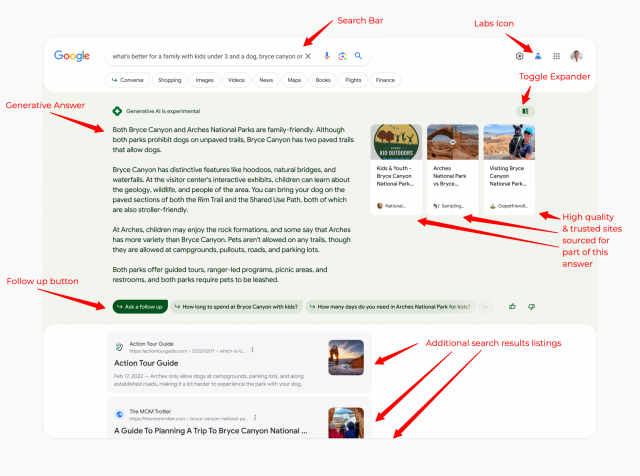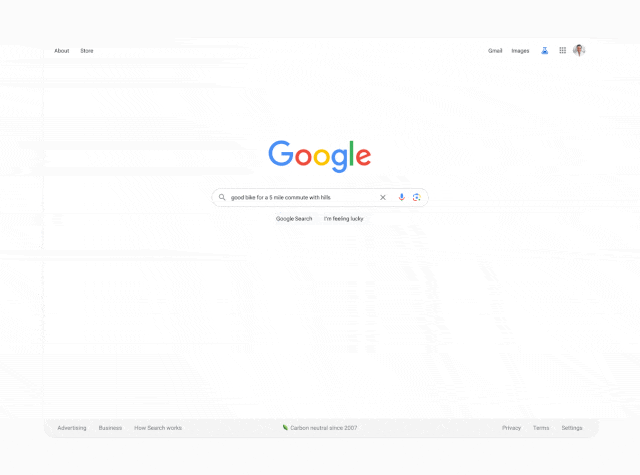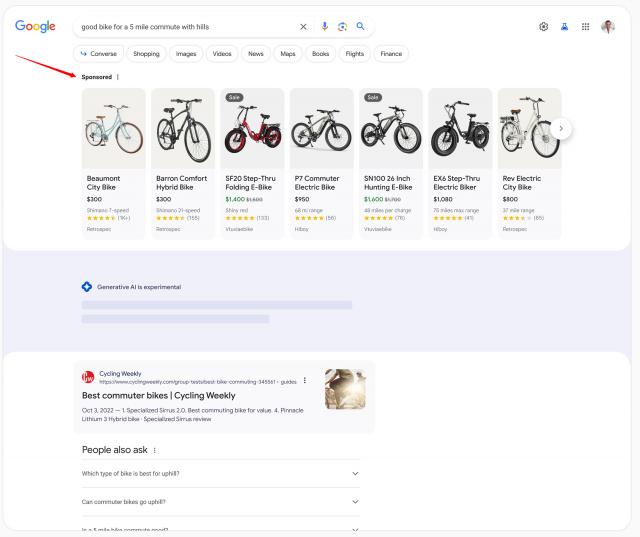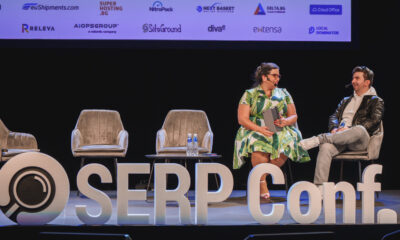SEARCHENGINES
Google Search Generative Experience – It’s All New AI Search Engine

Google announced a preview, a labs experiment, of its all-new search engine, it is calling Google Search Generative Experience. This is where Google brings in generative AI into the search interface and makes a search interface designed more for a youthful audience.
I covered this in super detail on Search Engine Land so here I will give a briefer overview of the changes, after having a night to sleep on it, and consuming feedback from the search marketing community.
In short, I was pleasantly surprised by the interface, as I expected the UI to be less generous to content creators, publishers, site owners, and SEOs. But I believe this interface does make efforts to generate clicks from the new search results interface to websites.
Here is a quick first impressions video I recorded for this blog post:
Quick Jump Links To Sections:
How It Looks & Feels
Here is a screenshot from Google that I mocked up to explain the all-new search interface from Google – you can click on the image to enlarge:
Google will generate an answer for some, not all questions, and show this animation of Google working up an answer. Google will show some of the more trusted and high-quality web sites as clickable links, with an image, title and URL, right in the answer box. These sites make up part of the answer and are sites Google has a high degree of trust, enough to show them in this answer box.
You can use the toggle expander button to dive deeper into the answers and/or ask follow-up questions below. Or scroll past it to see the more traditional search result listings.
Here is a GIF of it in action – do notice the products from the Shopping Graph (click to enlarge):
I have to say, I am pleasantly surprised with how Google is showing links to publishers. I don’t think most were thinking Google would be highlighting these publishers and content creators as much as they are here, after seeing the laughable way Google Bard handled citations, or lack thereof.
One note, Google said the colors of the answer box or container plays a role. The color can dynamically change based on the searcher’s specific journey types and the query intent itself, Google told me.
How It Works
Yea, this uses a bunch of AI, LLMs, and machine learning, including many exciting search algorithms to function. This new experience is powered by a variety of large language models, including an advanced version of MUM and PaLM2. This model is different from what Bard uses, it was trained to carry out tasks specific to search, including ways to identify high-quality sites that corroborate the information presented in the output, Google told us.
Yes, it uses Google Search’s core ranking systems for this purpose. Google said this helps them “significantly mitigate: some of the known limitations of LLMs, like hallucination or inaccuracies.
On top of that, Google also deploys its Search Quality Raters to evaluate these results and takes that feedback to improve the models going forward. Google also conducts adversarial testing of these systems to identify areas where the systems aren’t performing as intended, the company told me.
YMYL comes into play to, and if Google does show a response here, Google will add a disclaimer to YMYL categories of responses. Google told us “on health-related queries where we do show a response, the disclaimer emphasizes that people should not rely on the information for medical advice, and they should work with medical professionals for individualized care.”
And Google might not give generative answers when there is a lack of quality or reliable information, such as with “data voids” or “information gaps.” And Google won’t respond to explicit or dangerous topics.
Google applies the same policies it uses for featured snippets and autocomplete, as well as its other Search content policies.
Google rather not respond in a fluid tone because searchers are more likely to trust fluidity, Google told us. “We have found that giving the models leeway to create fluid, human-sounding responses results in a higher likelihood of inaccuracies (see limitations below) in the output. At the same time, when responses are fluid and conversational in nature, we have found that human evaluators are more likely to trust the responses and less likely to catch errors,” Google told us.
On Google Search Console and tracking clicks from the new search experience. Liz Reid from Google told me it is just a labs experiment now and Search Console integration is not planned right now. John Mueller of Google kind of said the same thing on Twitter:
It’s early days, and feedback is very welcome.
— John Mueller (official) — #StaplerLife · #DownWith (@JohnMu) May 10, 2023
Although I do doubt Google will add such a feature because they refused to do so with featured snippets.
But it will have a normal search referral:
AFAIK it has a normal Google search referrer.
— John Mueller (official) — #StaplerLife · #DownWith (@JohnMu) May 10, 2023
Search Ads
Finally, Google will show Google Ads in this new experience, just like it does in the normal Google Search. It will label those ads as “sponsored” with the black sponsored label. Your ads that you run in Google Search will potentially show here too. Right now there is no way to differentiate and say, do not show my ads in the new experience or not. But this is a super early beta, and Bing Chat does the same thing.
“We’ll test and evolve the ads experience as we learn more,” Google told us.
Here is what it looks like:
Ginny Marvin, the Google Ads Liaison, confirmed this with this tweet:
The Search ads that are displayed in these Search Generative Experiences are part of existing ad campaigns. This is not a new ad format or campaign type.
— AdsLiaison (@adsliaison) May 10, 2023
How To Sign Up
Google has opened its waitlist for the Search Generative Experience in Search Labs at labs.google.com/search. You can sign up to join the waitlist today. Click on the Labs icon in the Google app or Chrome desktop to express your interest, Google said.
Google won’t start inviting people to try it for a couple of weeks and those invites will go out in waves.
It will be available first on Chrome desktop and the Google App (Android and iOS) in the U.S. and English-only.
I believe some of the early reaction, without reading the details, were pretty negative but overall, I think when people see the layouts and links, they are surprised in a good way. I think, SEOs and content creators were expecting a lot worse. And honestly, I personally don’t think this is bad at all.
But here are some early reactions:
MY TAKE: It’s like featured snippets on steroids. Source sites appear prominently in the answer. Google wants users to “dig deeper into those sources”. Our challenge is be one of those sources. i.e. We have to keep producing quality, helpful content. 🙂 https://t.co/Vyry1KeiBt https://t.co/FvMGJ1LTUl
— Glenn Murray (@SilverPistol) May 11, 2023
Fair play. @Google has done a good job of this. https://t.co/ccmKXXg1jg
— Andrew Charlton (@bertiecharlton) May 10, 2023
.
And no one is going to take legal action?This is quite literally going to carve great big swathes into peoples traffic, reducing creators/publishers brand trust, and harming revenue.
And I bet @searchliaison will still run away when I ask for figures!#SEO #Magi https://t.co/pZWypYxO50
— Darth Autocrat (Lyndon NA) (@darth_na) May 10, 2023
I’m intrigued to try this out! Visually, it looks better than I expected.
— Chris Ainsworth (@chrisains) May 10, 2023
More zero-click searches! https://t.co/XU1B4lQWWl
— Shyamal Parikh (@Shyamal890) May 10, 2023
Google New AI search experience: “You’ll see an AI-powered snapshot of key information to consider, with links to dig deeper,” 🫡 👇 https://t.co/nxDO7xAjbW pic.twitter.com/n7GvQZDPeL
— Aleyda Solis 🇺🇦 (@aleyda) May 10, 2023
— Barry Schwartz (@rustybrick) May 10, 2023
It’s all well and good Google saying we’ll be compensated, but that’s meaningless. What does it even mean? That we’ll have a bot access the website once so our traffic remains the same? That’s worth exactly $0.00 in money terms.
— Wesley Copeland (@Wesley_Copeland) May 10, 2023
Grow. Your. Email. List. https://t.co/TC38RvtgkN
— Miles Beckler (@milesbeckler) May 10, 2023
So when all the websites die because Google ripped their content off and didn’t give them any clicks, where is this AI going to pull its facts from? https://t.co/4u2YbhDUBH
— Kirk McKeand (@MckKirk) May 10, 2023
https://t.co/6hNsA74wEx pic.twitter.com/V4RDTLkKu9
— Bradley Russell (@1BradleyRussell) May 10, 2023
Looking at this, following are my observations.
Google search may become more confined with information displayed on the google main page, rather than sending the visitor to the relevant website page.
This could be a threat for publishers and also if this happens, google… https://t.co/pKkM1LRkrN
— Abhishek Bhatnagar (@abhishek) May 10, 2023
Plenty of space for ads https://t.co/AKmf6plE3l
— Ben Zipkin (@bzipkin) May 10, 2023
Bing slayer with new generative #AI capabilities in Google search.#GoogleIO https://t.co/go49DARpid pic.twitter.com/rgQ7STFSuN
— Varun Kumar 🎶 (@DigitalVK) May 10, 2023
Google search will soon give an AI generated answer first, along with the ability to dialogue. In testing now.
Websites are still seen. Product recommendations powered by the shopping graph.
Google I/O showed Google Maps integration and much more. https://t.co/3Vp08qmMJH pic.twitter.com/HExuYCY24o
— Dr. Marie Haynes🌱 (@Marie_Haynes) May 10, 2023
No you won’t understand the topic better or more in-depth or gain more understanding you’ll just get a summarized version of information that leaves all that out so it will not make people more informed sadly you jumped on this train. Really sad to see it
— Kristine (@Schachin on Spoutible too) 🇺🇦 (@schachin) May 10, 2023
I agree. Light years better than what they showed originally.
To my eyes, it’s a prettier and slightly more story-focused interface than what they already do with featured snippets and PAA.
The snapshot thing is 3-4 featured snippets mashed together in essay form.
— Matt McGee (@mattmcgee) May 10, 2023
Magi is google snippets but much better.
Organic traffic for websites will nosedive if this works. https://t.co/1WKwXFEf59
— Anant (@ananttah) May 11, 2023
I had the same thought, slept on it last night and am now really excited for it. Yes, some loss, but a lot of room for experts to shine and beat the normal winners. Especially small businesses.
— Adam Riemer (@rollerblader) May 11, 2023
… Eg. you’ll get a list of best bikes for “5 mile commutes with hills” right there without needing to go to a review (affiliate) site; or “the best plan to run a 10K at the end of the summer for beginners” without having to go to the running/fitness site guide. Ouch. pic.twitter.com/rxhNYYRZ4e
— Aleyda Solis 🇺🇦 (@aleyda) May 11, 2023
Here is a quick poll that should update later today with results, so feel free to take it:
Okay, SEO community, how do we feel about how Google is bringing AI into search results? #GoogleIO
— Matt McGee (@mattmcgee) May 10, 2023
Forum discussion at Twitter and WebmasterWorld.
SEARCHENGINES
Daily Search Forum Recap: April 25, 2024
Here is a recap of what happened in the search forums today, through the eyes of the Search Engine Roundtable and other search forums on the web.
The Google March 2024 core update is still rolling out and the SEO chatter is super heated despite the tools calming. Google Ads API version 16.1 is now out. Google’s John Mueller says splitting and merging sites takes longer than normal site moves for Google to process. Google updated its favicon documentation. And a scathing report on how Google executive Prabhakar Raghavan killed Google Search.
Search Engine Roundtable Stories:
-
Google March Core Update Stilling Rolling Out & Heated SEO Chatter Continue
Over the past few days, while I was offline, the SEO chatter around the Google search ranking volatility continued to be super heated. The Google tracking tools seemed to calm down a bit, but the chatter is still very heated. This is all while the Google March 2024 core update is still rolling out 51 days later. -
Report: How Prabhakar Raghavan Killed Google Search
Ed Zitron wrote a piece named The Man Who Killed Google Search. It goes through in detail how Prabhakar Raghavan, Google’s former head of ads – led a coup so that he could run Google Search, and how an email chain from 2019 began a cascade of events that would lead to him running it into the ground, he said. -
Google Favicon Documentation Adds Rel Attribute Value Definitions
Google has updated its favicon documentation for Google Search to add definitions for each supported rel attribute value in the Google Search favicon documentation. -
Google Ads API Version 16.1 Now Available
Google released version 16.1 of the Google Ads API yesterday. The update includes query assets for Demand Gen, more location service details, more support warnings, Target ROAS bid simulation and more. -
Google: Splitting & Merging Sites Takes Longer Than Normal Site Migrations
Want to scare an SEO? Just tell them they need to manage a site migration. Want to make an SEO faint? Tell them they need to manage to split a site into two or more sites while merging content on those sites. John Mueller from Google said it takes Google longer to process site splits and merges than normal site migrations. -
Google Chefs In Dublin
Here is a photo I found on Instagram of a bunch of chefs at the Google office in Dublin. I am not sure if this was for some event or if Googlers were doing some sort of cooking class but it was a photo that caught my eye.
Other Great Search Threads:
- Interested in AI assistants within YouTube? -> The new experimental “Ask AI” feature in YouTube is pretty cool. Just tap the button and ask any question about the video you’re watching. Note, AI can’t control the video player as of n, Glenn Gabe on X
- What skeleton do you have in your closet?, WebmasterWorld
- Googlebot will crawl from one location (often the US), and if you redirect it based on its location, Googlebot would only see (and index) that country version. It’s better to use something like a banner., John Mueller on X
- I don’t know your sites, but even if the content’s the same, they’re essentially different sites (especially with ccTLDs), so it would be normal for a migration to affect them differently (and this seems to be quite a way back in the meantime)., John Mueller on X
- Search engines recrawl URLs at different rates, sometimes it’s multiple times a day, sometimes it’s once every few months. The verified removal tool is fastest, the public removal tool takes a few days because it needs to verify the URL properly., John Mueller on X
- You are now a Google Search Engineer. How do you fix organic search?, Gareth Boyd on X
Search Engine Land Stories:
Other Great Search Stories:
Analytics
Industry & Business
Links & Content Marketing
Local & Maps
Mobile & Voice
SEO
PPC
- PPC for Retail: Biggest Trends, Challenges, & Strategies for Success, WordStream
- Unlocking Success with Performance Max Campaigns, Location3 Media
- Discovering and Diagnosing a Google AdSense Rendering Bug, Merj
- Google delays third-party cookie demise yet again, Digiday
- How to Find and Use Competitor Keywords, Ahrefs
- Q&A: Promoting your app or game with Apple Search Ads, Apple Developer
- Updates to Healthcare and Medicines Policy (May 2024), Google Advertising Policies Help
- Windows 11 Start menu ads are now rolling out to everyone, The Verge
Search Features
Other Search
Feedback:
Have feedback on this daily recap; let me know on Twitter @rustybrick or @seroundtable, on Threads, Mastodon and Bluesky and you can follow us on Facebook and on Google News and make sure to subscribe to the YouTube channel, Apple Podcasts, Spotify, Google Podcasts or just contact us the old fashion way.
SEARCHENGINES
Google Won’t Change The 301 Signals For Ranking & SEO
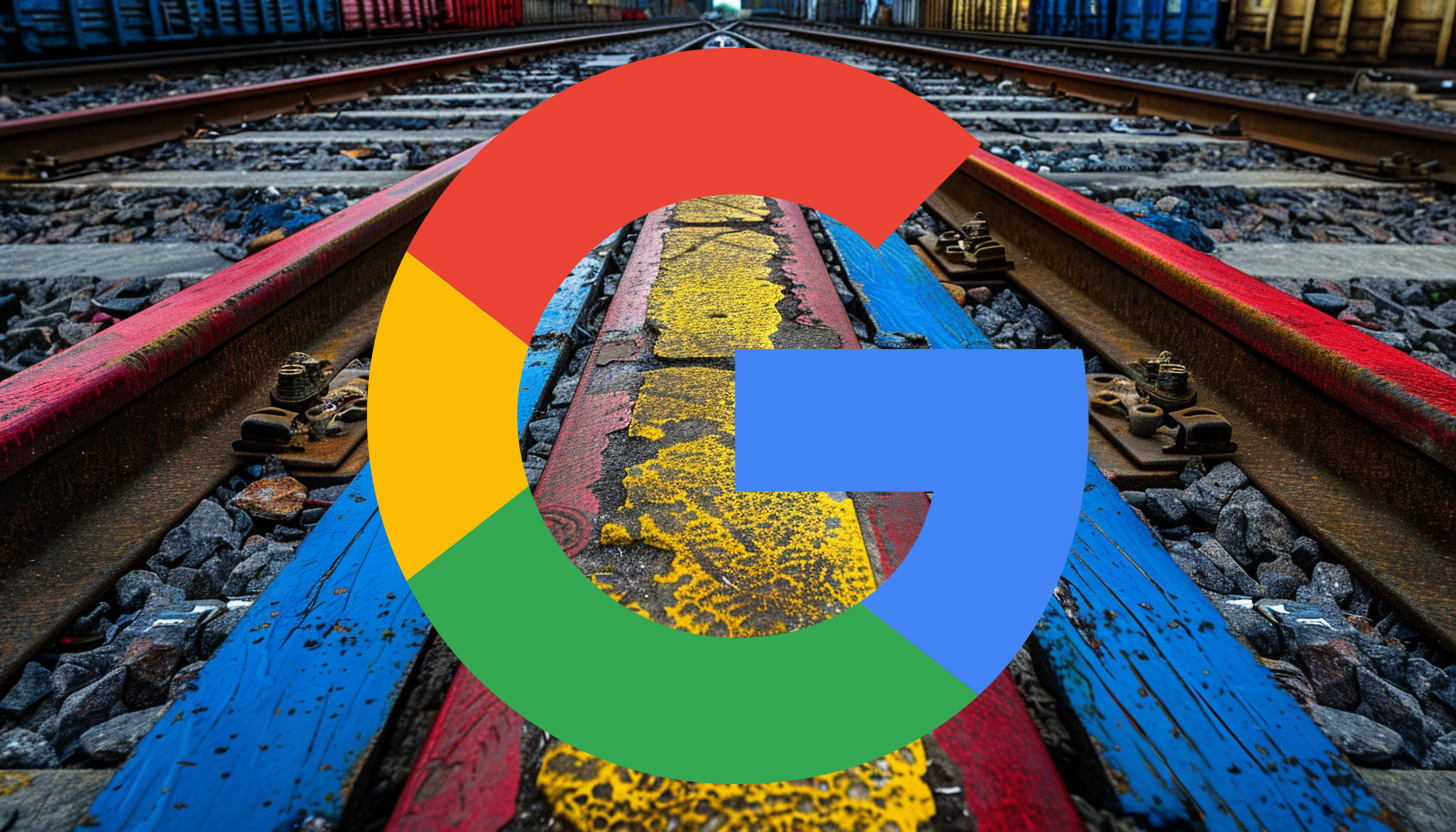
Gary Illyes from Google said on stage at the SERP conference last week that there is no way that Google would change how the 301 redirect signal works for SEO or search rankings. Gary added that it’s a very reliable signal.
Nikola Minkov quoted Gary Illyes as saying, “It is a very reliable signal, and there is no way we could change that signal,” when asked if a 301 redirect not working is a myth. Honestly, I am not sure the context of this question, as it is not clear from the post on X, but here it is:
More from @methode:
– 301 redirect not working is a myth. “It is a very reliable signal, and there is no way we could change that signal”.#SERPConf2024#SERPConf2024International— Nikola Minkov (@n_minkov) April 19, 2024
We’ve covered 301 redirects here countless times – but I never saw a myth that Google does not use 301 redirects as a signal for canonicalization or for passing signals from an old URL to the redirected URL.
Forum discussion at X.
Note: This was pre-written and scheduled to be posted today, I am currently offline for Passover.
SEARCHENGINES
Google Again Says Ignore Link Spam Especially To 404 Pages
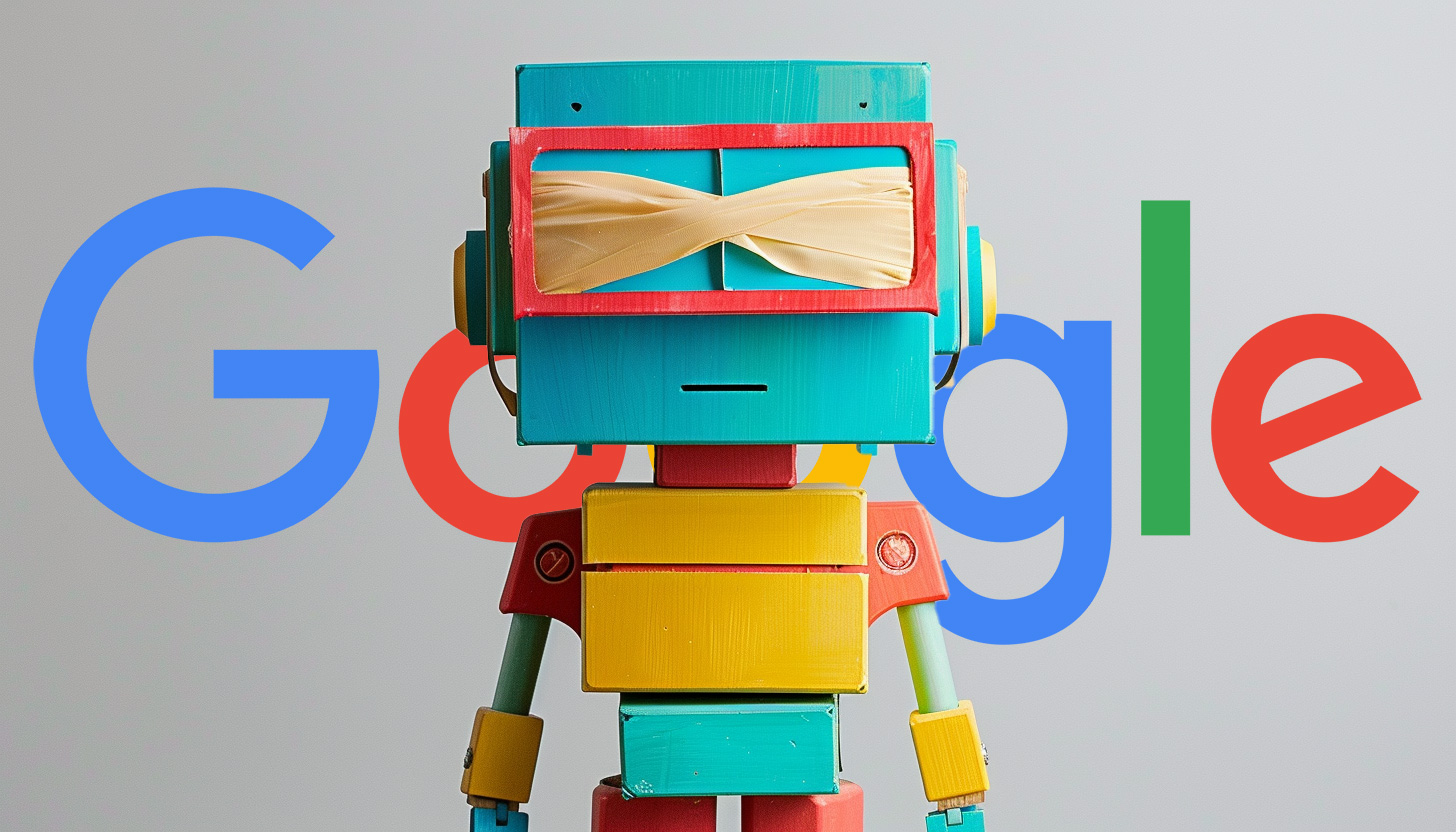
I am not sure how many times Google has said that you do not need to disavow spammy links, that you can ignore link spam attacks and that links pointing to pages that 404/410 are links that do not count – but John Mueller from Google said it again.
In a thread on X, John Mueller from Google wrote, “if the links are going to URLs that 404 on your site, they’re already dropped.” “They do nothing,” he added, “If there’s no indexable destination URL, there’s no link.”
John then added, “I’d generally ignore link-spam, and definitely ignore link-spam to 404s.”
Asking if it would hurt to disavow, after responding with the messages above, John wrote:
It will do absolutely nothing. I would take the time to rework a holistic & forward-looking strategy for the site overall instead of working on incremental tweaks (other tweaks might do something, but you probably need real change, not tweaks).
Earlier this year we had tons of SEOs notice spammy links to 404 error pages, John said ignore them. In 2021, Google said links to 404 pages do not count, Google also said that in 2012 and many other times.
Plus, outside of links to 404 pages, Google has said to ignore spammy links, time and time again – even the toxic links – ignore them. The messaging around this changed in 2016 when Penguin 4.0 was released and Google began devaluing links over demoting them.
Here are those new posts in context:
I’d say add both. Lol
— Jeremy Rivera (@JeremyRiveraSEO) April 11, 2024
Sure. But also, save yourself the work completely :-).
— John 🧀 … 🧀 (@JohnMu) April 11, 2024
Re-reading your initial post – if the links are going to URLs that 404 on your site, they’re already dropped. They do nothing. If there’s no indexable destination URL, there’s no link. I’d generally ignore link-spam, and definitely ignore link-spam to 404s.
— John 🧀 … 🧀 (@JohnMu) April 11, 2024
… but still… is this a dumb idea?
— Rebekah Edwards (@rebekah_creates) April 11, 2024
It will do absolutely nothing. I would take the time to rework a holistic & forward-looking strategy for the site overall instead of working on incremental tweaks (other tweaks might do something, but you probably need real change, not tweaks).
— John 🧀 … 🧀 (@JohnMu) April 11, 2024
And in general, Google says it ignores spammy links, so you should too (not new) but this post from John Mueller is:
I would just ignore them, Google ignores them too. Sometimes they’re just more visible in tools, but that doesn’t mean they’re a problem.
— John 🧀 … 🧀 (@JohnMu) April 18, 2024
And then also on Mastodon wrote about a similar situation, “Google has 2 decades of practice of ignoring spammy links. There’s no need to do anything for those links.”
Forum discussion at X.
Note: This was pre-written and scheduled to be posted today, I am currently offline for Passover.
-

 PPC6 days ago
PPC6 days ago19 Best SEO Tools in 2024 (For Every Use Case)
-
SEARCHENGINES6 days ago
Daily Search Forum Recap: April 19, 2024
-
SEARCHENGINES7 days ago
Daily Search Forum Recap: April 18, 2024
-

 WORDPRESS6 days ago
WORDPRESS6 days agoHow to Make $5000 of Passive Income Every Month in WordPress
-

 WORDPRESS7 days ago
WORDPRESS7 days ago10 Amazing WordPress Design Resouces – WordPress.com News
-

 SEO6 days ago
SEO6 days ago25 WordPress Alternatives Best For SEO
-

 WORDPRESS6 days ago
WORDPRESS6 days ago7 Best WooCommerce Points and Rewards Plugins (Free & Paid)
-

 MARKETING5 days ago
MARKETING5 days agoBattling for Attention in the 2024 Election Year Media Frenzy


